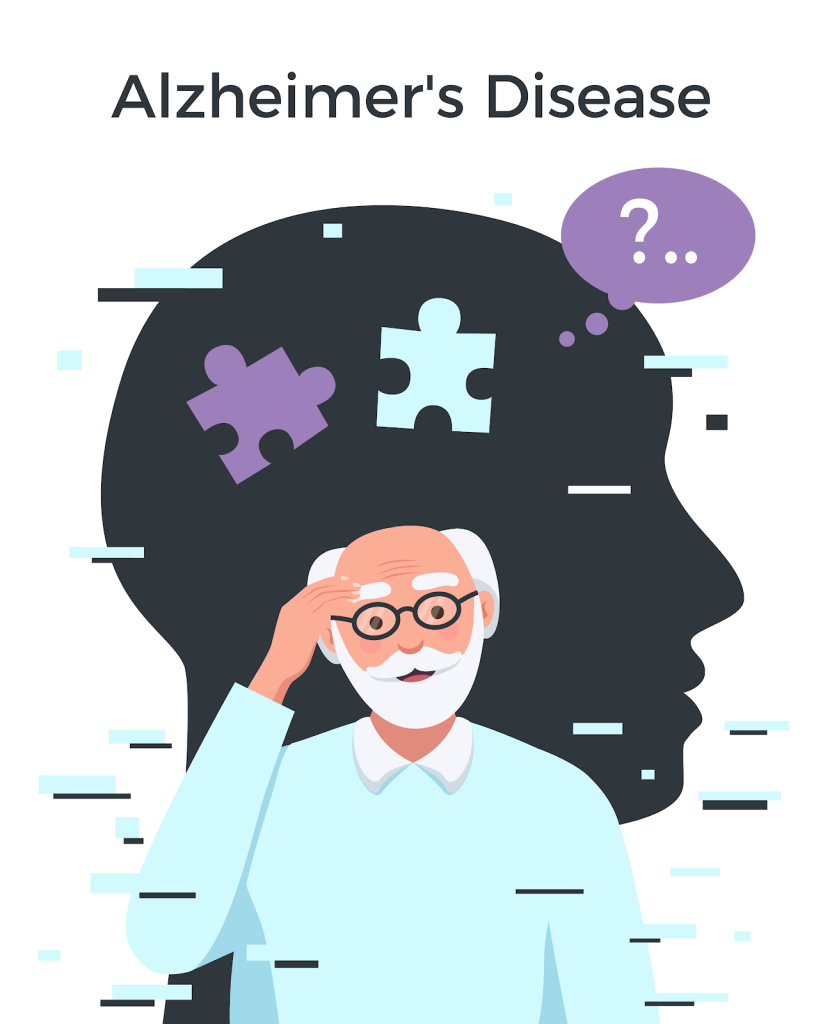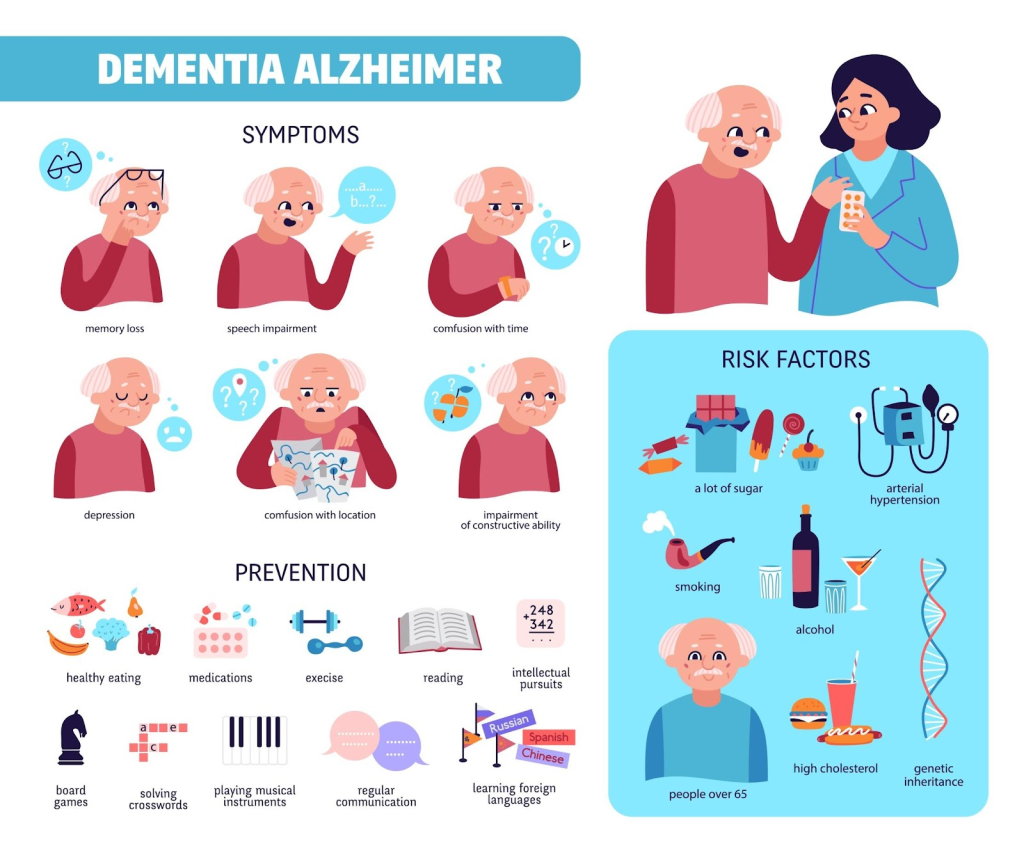Disclaimer:
This article is for information purposes only. It is not a substitute for medical advice or treatment. Seek medical care for your treatment.
What is Dementia?
Dementia also known as neurocognitive disorder, is a broad term that describes a group of symptoms impacting your memory, logical thinking and social capacities severe enough to intervene with your day to day life. It is not a distinct disease but various other diseases can cause dementia. It is the result of the damage caused to the parts of brain that are used for memory, learning, decision making and language.
Although dementia typically involves memory loss, memory loss has various other causes. Memory loss alone doesn’t mean you have dementia, although it is often one of the initial signs of the illness.
Approximately 5%-8% adults over the age of 65 experience some form of dementia. This figure doubles every 5 years after the age of 65. Half of the people in 80’s have dementia.
Alzheimer’s is the most frequent maker of a progressive dementia among elderly adults, but there are several other root causes of dementia. Probably 60%-80% of people with dementia have Alzheimer’s. Some dementia symptoms are reversible based on its cause.
How common is dementia and who is more likely to get dementia?
Dementia is regarded as a ‘delayed illness’ because it tends to occur in older adults. Probably 5%-8% of people above the age of 65 years have some form of dementia and this number increases twice after every five years above that age. It is estimated that nearly half of people aged 85 or older suffer from dementia.
The U.S. CDC evaluate that 5 million U.S. adults of age 65 or older have Alzheimer’s and linked dementia. By 2060, CDC reckons that about 14 million people will have dementia, which approximately 3.3% of the population. Alzheimer’s is the 6th foremost cause of death in the U.S. and 5th prime cause of death in 65 years old Americans.
Symptoms of dementia:

Dementia symptoms may get better with proper treatment. But the other ailments caused by dementia are not treatable. Dementia directly affects your thinking and remembering ability. There are different dementia symptoms depending on the cause but some of the common signs and symptoms are:
Cognitive changes:
- Keep on forgetting things or Memory loss which is generally observed by others
- Problems in communicating or finding words
- Not remembering the season, year or month
- Problems in visual and spatial abilities especially getting disoriented while driving
- Change in sleeping patterns
- Difficulty in resolving problems and reasoning
- Problems in planning and organizing things
- Issues in handling difficult tasks
- Difficulty in motor and coordination activities
- Disorientation
- Being dependent on others for daily activities like grooming, bathing, brushing and eating
Psychological changes
- Changes in personality
- Depression
- Anxiety
- Paranoia
- Frustration
- suspiciousness
- Agitation
- Hallucinations
These symptoms are the common symptoms of dementia. Each individual diagnosed with dementia has various symptoms, depending on the affected area of the brain. Additional symptoms happen with specific types of dementia.
Causes of dementia:

Dementia affects your nerve cells and their connections to the brain, which further harms your brains potential to communicate with its different areas. Dementia also happens because of the clogged blood flow in your brain, depriving it of the required oxygen and nutrients. Brain tissues perish without oxygen and nutrients. Some diseases may look like dementia, such as those caused by a reaction to medicines and deficiency of vitamin and they might get better with the treatment. Some dementias are not reversible and may worsen with the passage of time.
General causes of dementia are:
Degenerative neurological diseases:

- Parkinson’s diseases
- Alzheimer’s disease
- Huntington’s disease
- Multiple sclerosis
With the passage of time these diseases worsen.
Vascular disorders: these diseases hamper the blood circulation in your brain.

- Harrowing brain injuries caused by any accident, fall or a sudden shock.
- Certain central nervous system infections such as, meningitis, HIV and Creutzfeldt-Jakob disease.
- Prolong use of drug or alcohol.
- Accumulation of fluid in the brain.
Certain reversible causes of dementia are:
- Alcohol or drug use disorder
- Tumors
- Subdural hematomas, blood clotting under the outer covering of the brain.
- Hydrocephalus
- Vitamin B12 deficiency
- Hypothyroidism
- Hypoglycemia
- HIV-associated neurological disorders
How to prevent dementia:
There is no certain way to prevent dementia but some preventive measures can help to some extent:

- Stay mentally active: mentally exciting activities like reading, puzzle solving, playing scrabble and memory training might obstruct the beginning of dementia and minimize its effects.
- Be socially and physically active: social and physical activity might interrupt the onset of dementia and its symptoms. Try to do at least 150 minutes of physical activity once in a week.
- Give up smoking: smoking elevate your risk of dementia and blood vessel conditions.
- Get sufficient vitamin: low levels of vitamin D in your blood develops Alzheimer’s disease and other forms of dementia. Vitamin D can be attained through some foods, supplements or sun exposure. Vitamin C and vitamin B-complex might help.
- Control cardiovascular risk factors: if you are obese lose your weight. Keep a check on your blood pressure, high cholesterol and diabetes. High blood pressure increases the risk of some types of dementia. Somehow more research is needed in this regard.
- Get a treatment for your health conditions: for depression and anxiety visit your doctor.
- Eat healthy diet: a diet rich in vegetables, fruits, whole grains, fish and nuts boost your health and decrease the risk of developing dementia. This diet also encourages cardiovascular health.
- Quality sleep: maintain a good sleep schedule.
- Treat your hearing problems: hearing problems increase the risk of developing dementia.
Conclusion:
Identifying early signs of dementia can help you and your family to plan your life accordingly. Consult your doctor so that he can help you. Approximately 20% of the causes of dementia are reversible.




